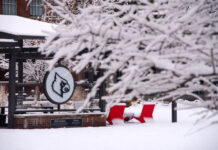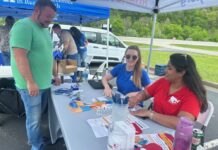
Andrea Heming, who is pursuing a master of science in Social Work degree, also happens to be a Marine Science technician in the Coast Guard Reserves. She has been involved in response efforts for some of the worst disasters throughout the past few years.
As a Marine Scientist, Heming enforces maritime environmental laws, investigates oil and hazardous waste spills and manages federal disasters, such as hurricane response.
In 2006, Heming was deployed to New Orleans in support of hurricane Katrina recovery efforts. In 2017, she was activated for hurricane Harvey recovery. In 2019, she was activated to respond to the longest-running oil spill in in U.S. history in the Gulf of Mexico, where recovery efforts have resulted in the capture of almost 800,000 gallons of oil leaking from a downed oil rig.
Heming’s early time in the Coast Guard saw her serve onboard the largest icebreaker on the Great Lakes, ICEBREAKER MACKINAW WAGB-83, known as the “Queen of the Great Lakes.”
When she was looking for MSSW programs, Heming said some of the other schools she looked into were not as understanding of her “winding academic journey.” She said the fact that UofL has been repeatedly designated a “Military-Friendly” institution is what sold her on becoming a Cardinal. She intends to use her MSSW degree to help those with trauma via nontraditional and alternative therapies, including the new wave of psychedelic research that seems promising for PTSD treatment.
On Aug 4, 2021, we recognize and celebrate the 231st birthday of the U.S. Coast Guard and its precursors, the Revenue Marine, the Revenue Cutter Service and the U.S. Life Saving Service.
Story submitted by Kyle Hurwitz, UofL director of Military and Online Initiatives.






























